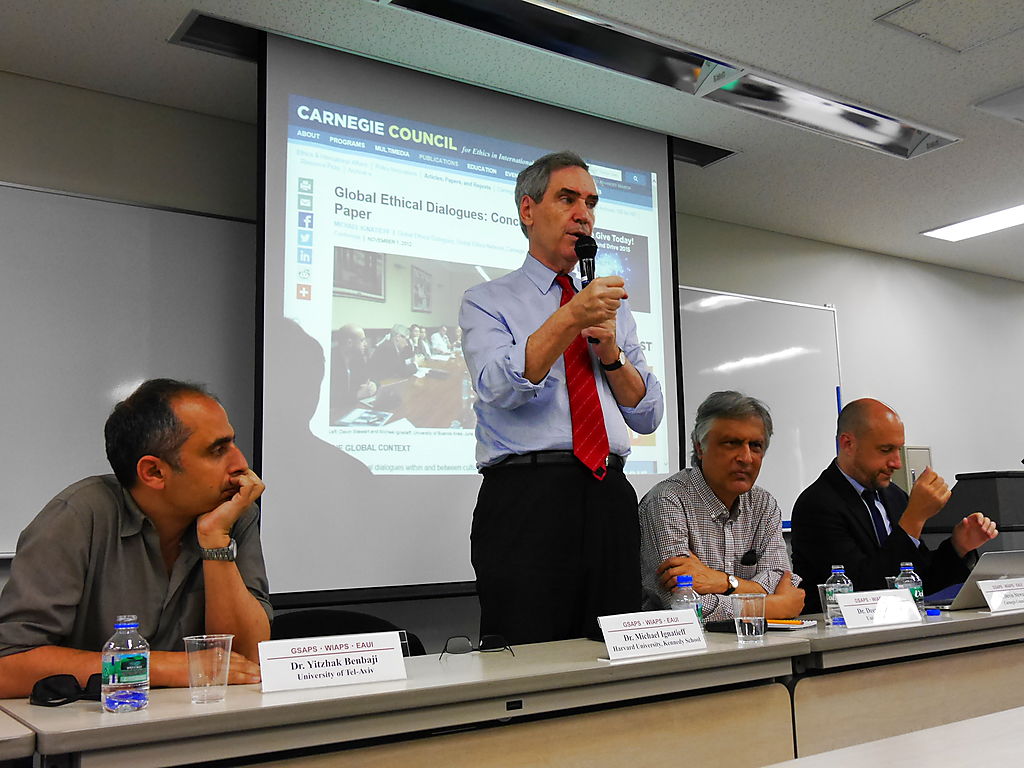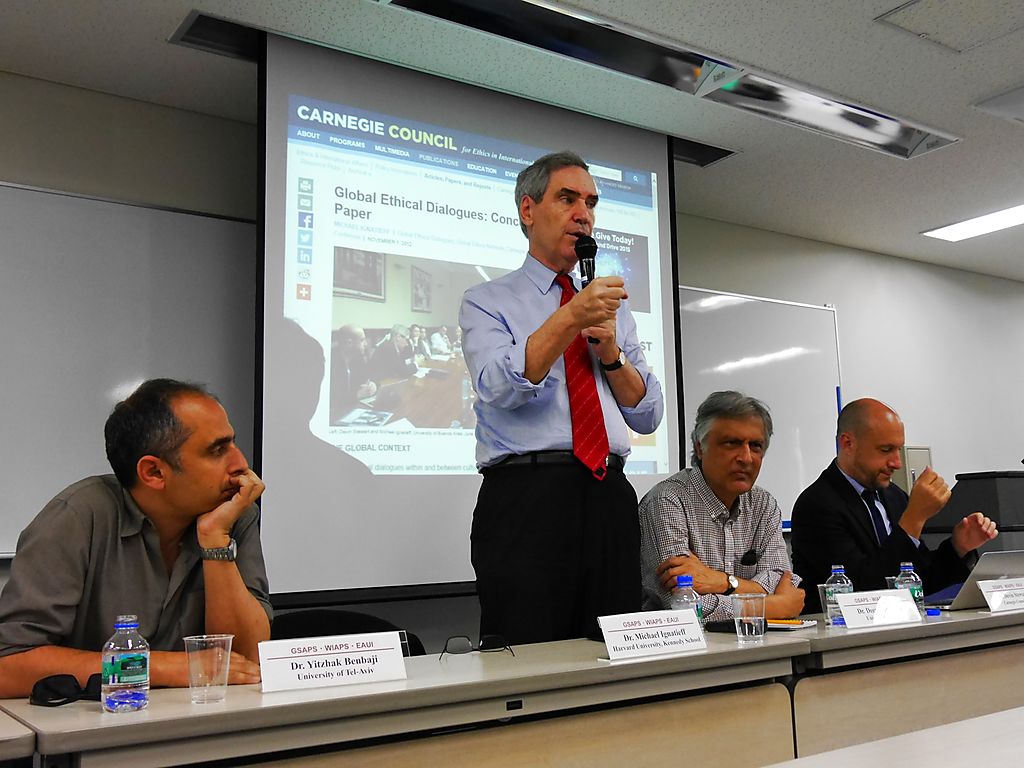Academics from around the world visit Waseda for “Global Ethics in East Asia” forum
Tue, Jun 9, 2015-
Tags
A forum on global ethics, Fukushima, and the future of nuclear power
Led by Professor Michael Ignatieff of Harvard University
On June 4, Waseda University’s Graduate School of Asia-Pacific Studies (GSAPS) hosted a forum led by Harvard Professor Michael Ignatieff entitled “Global Ethics in East Asia.” The forum is part of a series of dialogue programs organized by the Carnegie Council for Ethics in International Affairs. Academics from around the world joined the panel to discuss current ethical issues, particularly pertaining to Japan’s use of nuclear power following the 3/11 disaster.

Dozens of students attended the forum held on June 4
GSAPS Professor Hatsue Shinohara opened the forum by introducing issues that Japan faces regarding citizenship and ethnicity, war and reconciliation, and the challenges of democracy. Following Shinohara’s opening address was a presentation on technology and ethics from PhD student Rikiya Takahashi who posed the question of whether it is ethical to continue using nuclear energy in light of the nuclear disaster in Fukushima. Takahashi discussed the implications of nuclear energy from inter-generational, socio-economic, and global perspectives before turning the discussion over to Ignatieff.
Ignatieff asked members of the audience if Japan should continue using nuclear power. Some members argued that the dangers of nuclear power are not worth the benefits considering the availability of alternative, renewable resources. Others argued that alternative, renewable energy resources have not yet reached a stage of development in which they can be utilized efficiently to meet the demands of society and that the most probable alternative, coal, inflicts greater harm upon the environment – citing Japan’s increased use of coal-fire following the nuclear disaster and subsequent increase in greenhouse gas emissions.

Students enthusiastically participated in the forum, presenting their opinions about issues raised by the panel
Dr. Yitzhak Benbaji from the University of Tel-Aviv discussed the importance and challenges of conducting a cost-benefit analysis in regards to the continued use of nuclear power, especially the challenges of calculating risks externalized onto future generations. Dr. Helle Porsdam from the University of Copenhagen argued politicians do not tend to concern themselves with burdens allocated to future generations as they are mostly concerned with being reelected. Dr. Bartlomiej Nowak from Vistula University added that the quality of technology needs to be considered when conducting a cost-benefit analysis, arguing that the quality of nuclear power technology in some countries is superior to others’ and that technology will make significant progress over time.
Members of the audience, among them primarily students, enthusiastically gave their opinions regarding issues raised by the panel. One student commented that society is dependent on current methods of energy production because the amount of energy it takes to produce renewable, alternative forms of energy exceeds the amount the alternative sources produce. Therefore, the best solution is to continue using current methods of energy production while aggressively researching and developing renewable energy technology. Ignatieff challenged this point, arguing that investment in nuclear energy restricts investment in alternative forms of energy.

Professor Ignatieff discussed issues regarding nuclear power as well as solutions going into the future
“A Japanese expert I was talking to yesterday said one of the reasons we are so slow developing alternative energy is we’ve invested so much in nuclear. The incentives of nuclear are so strongly aligned for major Japanese corporations that they’ve systemically underinvested in solar, wind, and geothermal…..Nuclear has a stranglehold on investment across the energy sector,” said Ignatieff.
One Chinese student raised the issue of present political systems’ effectiveness in dealing with these types of ethical issues. In relation to his government’s plans to bring a nuclear power plant to his hometown, he discussed that although he is opposed to the power plant due to the risks, most residents of the community are in favor because of the jobs the plant will create. In regards to this point, Dr. Deen Chatterjee commented on the importance of a well-informed citizenry within a democratic system.
“Democracy really works well only when we have an informed citizenry. The question of public education and enlightened citizens are the core issues of democracy. Without that, democracy simply is procedural and nothing else…The disaster of 3/11 was a wake-up call and at times that is needed to wake people up from their peaceful slumber so they can thing about things besides their immediate comfort,” said Chatterjee.

Dr. Emiliano Buis from the University of Buenos Aires discusses the challenges of addressing risk at the international level
As the forum came to a close, the panel shifted their discussion to the interdependence of national and international policy-making and how risks and other ethical issues should be addressed at the international level.
“The sense of believing that small, local solutions can add up to big ones is terribly important here. Otherwise, we come out of the afternoon thinking “Well, this is a big problem,” and nothing is solvable. Whatever you think about the nuclear issue, we have to find solutions, and we have to scale them one by one into something big,” said Ignatieff as he concluded the forum.
“Global Ethics in East Asia” panelists
Dr. Michael Ignatieff (Harvard University, Kennedy School)
Dr. Yitzhak Benbaji (University of Tel-Aviv)
Dr. Emiliano Buis (University of Buenos Aires)
Dr. Jean-Marc Coicaud (Rutgers University)
Dr. Deen Chatterjee (University of Utah)
Dr. Bartłomiej Nowak (Vistula University)
Dr. Helle Porsdam (University of Copenhagen)
Dr. David Rodin (University of Oxford)












